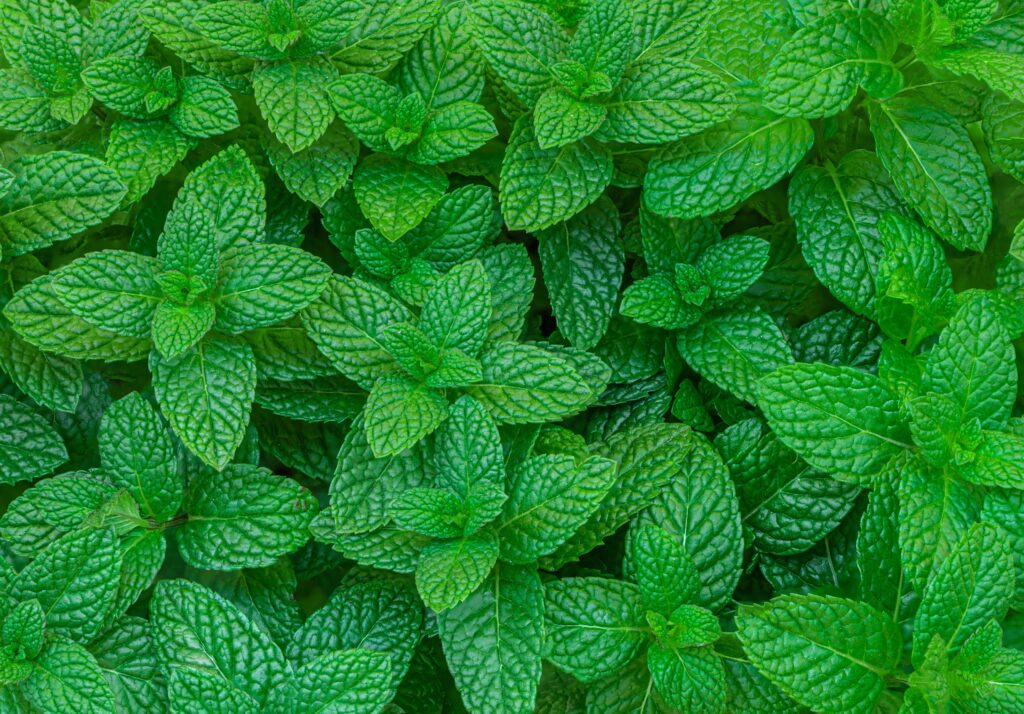If you’re a fan of mint, you’re in luck: this popular household herb actually offers a range of health benefits beyond just its refreshing flavor and breath-freshening properties. In fact, experts and research suggest that mint has been used for its medicinal properties for thousands of years.
Let’s explore the various ways that mint can benefit your health, as well as the best ways to use it at home. From reducing inflammation to improving digestion, you’ll discover why mint is more than just a tasty addition to your meals.

The Nutritional Profile of Mint
Mint is a low-calorie herb that is packed with micronutrients. A ¼ cup serving of fresh peppermint contains only 4 calories and 0 grams of fat. It also provides 136 International Units (IU) of Vitamin A, which is 15% of the Daily Value (DV) for an average adult. Additionally, it contains 0.04 mg of manganese, which is 2% DV, 0.2 mg of iron, which is 1% DV, and 3.7 mg of folate, which is 1% DV. Mint is also a good source of fiber, providing 0.25 g per serving. Incorporating mint into your diet can help you meet your daily micronutrient needs.
The 7 Top Health Benefits of Mint
Mint is a flowering herb with a unique nutritional breakdown that offers several health benefits. Its plant compound and essential oil content, including flavonoids, menthol, and terpenes, make it a valuable addition to your diet. Here are the top seven health benefits of mint:
Boosts Immune Health
Mint is a rich source of polyphenols and flavonoids, two groups of plant compounds that act as antioxidants and protect cells against free radicals that cause damage. These bioactive compounds also help reduce inflammation, further boosting the immune system. Research has even found mint to exhibit anticancer activity.

Supports Oral Health
Peppermint oil, found in mint, boasts antibacterial, antifungal, and antibiofilm properties that prevent or help treat a range of oral health concerns. These benefits well justify the frequent use of this popular herb in modern-day dentistry.

Encourages Better Eye Health
Mint is a good source of vitamin A, which plays an integral role in several systems required for optimal eye function. Vitamin A also helps to keep certain eye diseases, like macular degeneration, at bay.

Champions Brain and Sleep Health
Emerging research has even found mint to positively benefit several aspects of brain health and sleep, likely due to its bioactive compound content. A 2018 study discovered peppermint to improve cognitive function and decrease mental fatigue. Meanwhile, a 2021 study found peppermint intake to improve memory and sleep quality, while reducing signs of stress and anxiety. Additionally, a 2020 study tied peppermint aromatherapy to better sleep quality in cancer patients.

Promotes Gut Health
Mint, especially peppermint, has been linked to improved gut health as a smooth muscle relaxant for the entirety of the gastrointestinal (GI) tract. This bodes well for almost any GI concern that you might have, from gas and bloat to constipation and diarrhea. Additionally, research has found this herb to be particularly beneficial for irritable bowel syndrome (IBS) symptoms.

Aids Heart and Metabolic Health
Mint is high in antioxidants, making it effective in preventing chronic diseases like heart disease and diabetes. The compounds found in mint fight free radicals and target inflammation in the body, both of which are major contributors to these serious conditions.

Supports Respiratory and Sinus Health
Mint can encourage better respiratory and sinus health due to its antibacterial and antiviral properties, helping to target the cause of any respiratory or sinus irritation or infection. Mint acts as an expectorant, which helps to break up mucus and phlegm to lessen coughs. Plus, mint has been known to soothe sore throats and alleviate pain throughout the body—other common concerns associated with chest and sinus issues.
Incorporating mint into your diet can offer a range of health benefits, from boosting your immune system to promoting gut health and aiding heart and metabolic health. Try adding mint leaves to your salads, smoothies, or tea, or use peppermint oil to freshen your breath or relieve headaches.
How Much Mint Should You Have Everyday?
While there is no official recommendation on how much mint to consume daily, it is safe to enjoy on a daily basis. The bioactive compound content and nutritional profiles across all mint varieties are largely the same, with peppermint being the most mainstream and abundantly produced.
You are far more likely to get sick of the bright, pungent flavor of mint before overdoing it. According to Geiger, a little bit goes a long way. Therefore, even if you enjoyed a few cups of mint tea, a recipe containing mint, and some mint aromatherapy all on the same day, there is no concern of adverse effects.
On the other hand, if you only consume mint a few times per week, you will still reap some benefits. So, feel free to add a sprig of mint to your water or tea, incorporate it into your meals, or enjoy it as an aromatherapy oil. A little bit of mint can go a long way in providing you with its health benefits.
| Tips for consuming mint daily |
|---|
| Add a sprig of mint to your water or tea |
| Incorporate mint into your meals |
| Enjoy mint as an aromatherapy oil |

Ways to Use Mint at Home
Mint is a versatile herb that can be used in various ways at home. One of the most popular ways to use mint is by making mint tea. You can easily make mint tea by adding a few tablespoons of fresh or dried mint to boiling water. You can also purchase bagged mint tea at most grocery stores nationwide.
Aside from making tea, mint can also be used in various culinary applications. You can add mint to a watermelon cucumber salad, smoothies, infused water, or even pesto. Mint can also be a delicious addition to marinades, soups, baked goods, and even breading for proteins.
If you’re looking for a natural alternative to gum or breath mints, you can chew on whole fresh mint leaves. You can also opt for mint essential oil aromatherapy or topical application. However, if you plan to use mint essential oil on your skin, make sure to dilute it in a carrier oil like coconut or jojoba to prevent irritation.
In summary, mint is a versatile herb that can be used in various ways at home. From making tea to adding it to your favorite dishes, there’s no shortage of ways to utilize this invigorating herb.
The Bottom Line
Incorporating mint into your diet can provide both delicious taste and numerous health benefits. From freshening breath to boosting overall health, this versatile herb is a must-have in your kitchen. Whether you choose to purchase fresh mint or grow it at home, the investment is well worth it. Consider adding mint to your daily routine by incorporating it into recipes or enjoying it as a refreshing tea. Your taste buds and your body will thank you.









